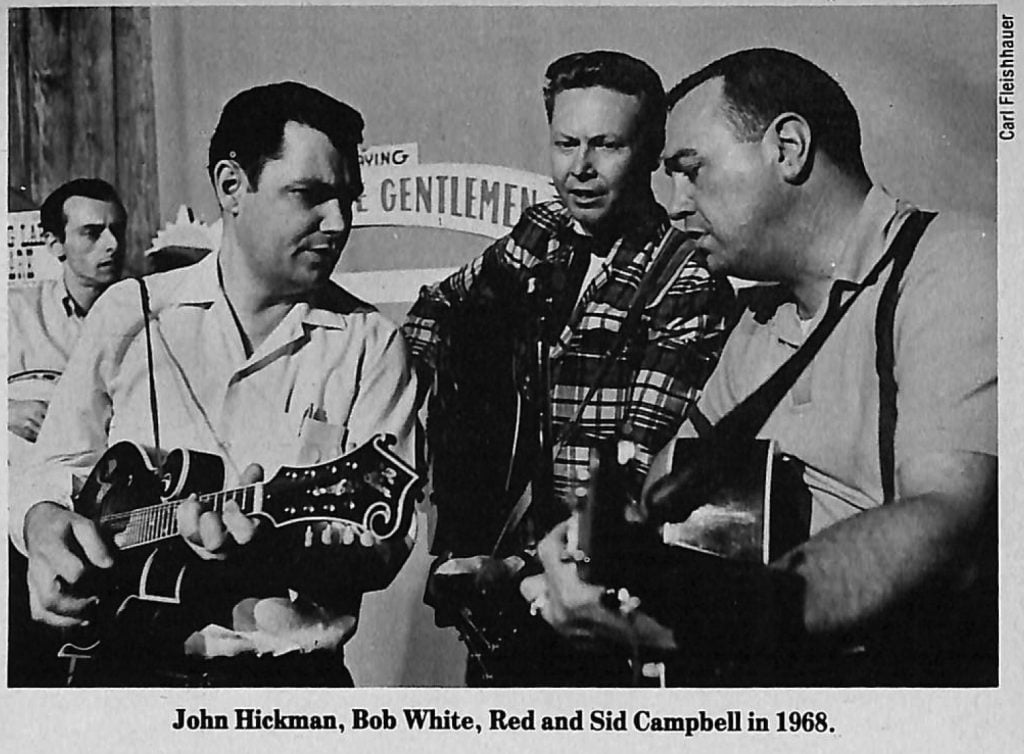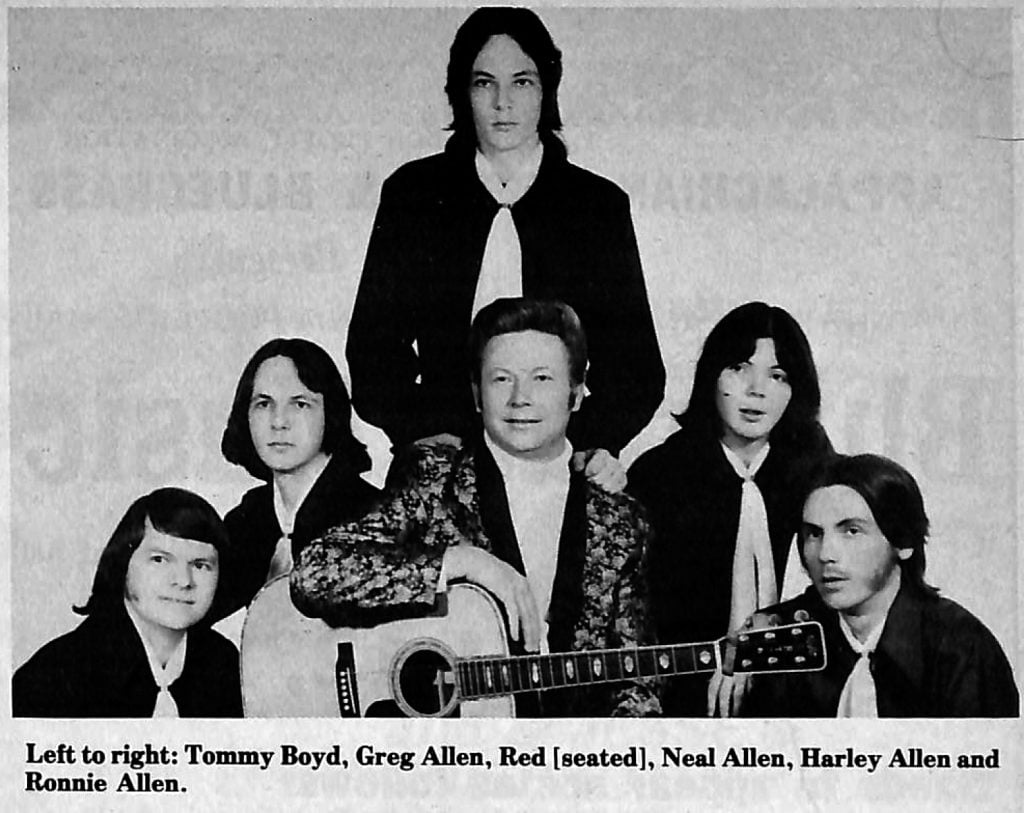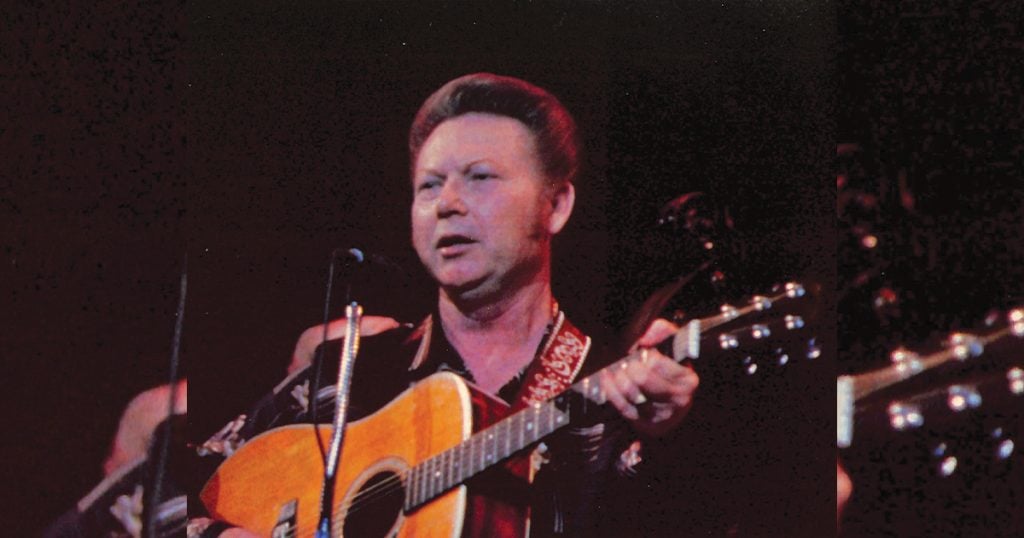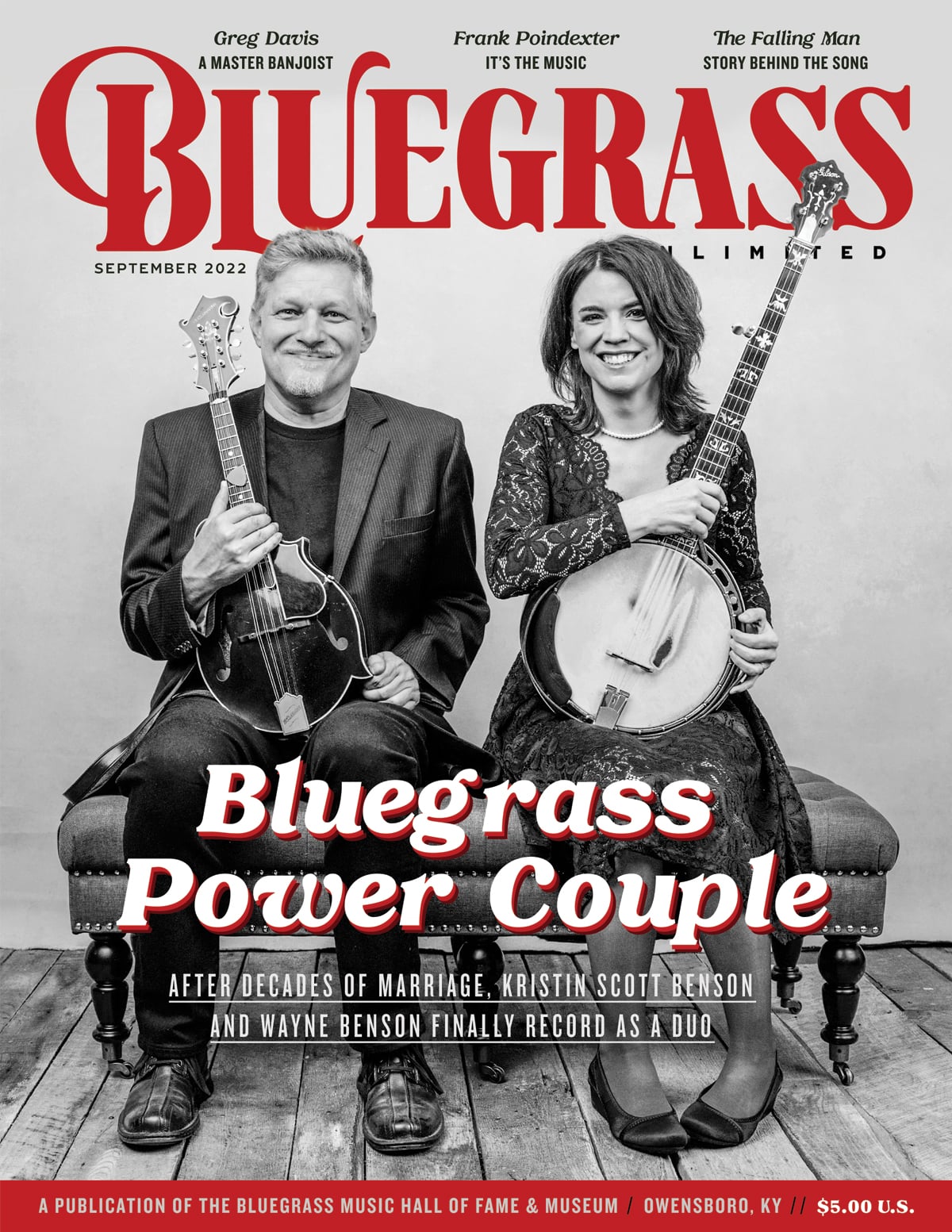Home > Articles > The Archives > A Conversation with Red Allen
A Conversation with Red Allen
Reprinted from Bluegrass Unlimited Magazine
June 1979, Volume 13, Number 12
Rared back in the black leather chair, smiling expansively under his framed Kentucky Colonel award, Red Allen is a generous host and an entertaining companion.
Seemingly unchanged by the passage of time and the rigors of open-heart surgery, his grin is as infectious as ever, the ready laugh accompanies the unending stories, and the confidence that comes from a wealth of inborn talent is always apparent.
Hard years on the road and recent illness have not quenched the spark and intensity that have made Red unique among bluegrass singers.
If there is a difference in Red, it is a subtle one. The tension is gone; the taut, high-strung young man has mellowed into a man comfortable with his own abilities and at home in a world he has helped to create.
A new project for Red in recent months is his own weekly radio show, over WDXL-FM, Dayton, Ohio, which is also carried over sister station WQRB-FM in West Carrollton, Ohio. Each Thursday night, from seven until nine, Red fields telephone calls, plays records, and tells some of the anecdotes for which he is justly famous.
“It’s strictly bluegrass,” Red says about the program. “I play records and B.S. I’ve got the highest rating of any DJ out there. I take telephone calls, take requests, just talk to people on the air and tell stories about musicians. All I have to do is the weather and the station I.D.”
In addition to enthusiasm about his radio program, Red is excited about a new record album on the Folkways label which is scheduled for release about the end of February in both the United States and Japan.
To be titled “Live And Let Live,” the album features some of the musicians who have worked with Red through the years: his sons Greg and Harley; along with Jerry Butler and Ron Mesing from his present band; Tommy Boyd and Danny Million on Dobro; David and Dorsey Harvey on mandolin; Buddy Griffin on fiddle; and Red Hartley on bass.
Reflecting on these new undertakings, his career, bluegrass music, and various related topics. Red offers comments and opinions on a variety of subjects.
About his health these days, and how it affects his music: “I enjoy myself on stage, especially since I quit drinking. I’m playing better music and making more money than I ever have in my life.
“I don’t sing tenor at all anymore since I’ve had open-heart surgery. I never did like to sing it, but never could find anybody who could sing it right. Back in my day, and even now, you can’t shake them out of the trees!
“I just wanted to sing lead and play guitar, and front the show.
“Since I’m not hungry anymore and don’t have to get out there and hunt for them, I just sing one key higher than Lester Flatt. It’s just no strain at all, and my records sell just as good as they did when I was singing ‘Close By’ in B flat.
“I never did want to be rich, but I just wanted to have a couple of Lincolns and a nice house and nice clothes and a little money in the bank. I could quit now and live out my days. I don’t have to play, but I enjoy my music and enjoy having a good tight band. I like to keep the friends and fans and play good music to them. Some of them I didn’t play good music to back when I was drinking.
“I have a chance to go to Hawaii in the cold months. I’ve also been asked to go to Japan and England and France and Germany. I might go. I’m leery of flying. It’s according to how I feel and what happens about my heart condition. I’m not planning on straining or going anywhere like that until I find out about that.” Curtailing his performances to suit his schedule, (“I play at my own convenience and if the money is right,”) Red has put together a band he respects and enjoys playing with.
“I can’t play and sing with any person I don’t like, I don’t care how good they are. I’ve got to like a man first. Being a good man is as important as being a good picker and singer.
He describes his present band: “The band is Jerry Butler, mandolin, sings good tenor; Harry Shafer, banjo, don’t sing a lick; Ron Mesing, Dobro, from Pittsburgh, and Red Spurlock, bass, sings baritone.

“I don’t like to rehearse. We run through something a few times and probably know the first two songs we’re going to do, then we’re likely to do anything.
“Jerry knows my songs better than I do because he says he learned to sing and play off my records. I take that as a compliment. When we get requests for ‘Philadelphia Lawyer’ and other things I’ve done through the years that I don’t remember, he knows right how they’re supposed to be.
“I appreciate hearing anyone doing a song I wrote or recorded. I think that’s one great compliment.
“Harry also knew my material when he came. He knew my material and the way I wanted it. Harry is a driving banjo player.
“Jerry Butler is one of the best tenor singers and mandolin players. He was the easiest man to come in. He knew what I wanted when he come. He knew my material better than I did, and now he writes out what he wants to do and says ‘Is it o.k. if we do this show?’ All he had to learn was when I breathe, and things like that.”
In talking about his early years playing music, Red says: “I was learning chords—I don’t know if they’d took the band off my arm when I come from the hospital! I guess I was eight or nine when I learned G and C and D, and that’s about all I know now. That and a few runs and a good right arm.
“I think me and the Osbornes screwed up a lot of people with high lead and they got caught up trying to learn that. That’s why you don’t hear good driving bluegrass like Flatt and Scruggs and Jimmy Martin.” Some of the early influences on Red’s music were: “Lester Flatt, Curley Seckler, and Earl Scruggs. Curley’s ole lonesome high hollering tenor. Can’t nobody do it like Seek.
“Me and Seek has been planning on doing an album together for the last ten years and haven’t got around to it.
“Ira Louvin is the greatest tenor singer ever stood next to me. Me and Charlie (Louvin) and Ira was going to do an all-trio album before they broke up. We rehearsed and discussed it in Washington D.C. in Tom Morgan’s basement, and we did some show dates together about 1963, and then they broke up. We had me singing baritone and switching parts, and we would have done it if they hadn’t done a split. Ira is the greatest tenor singer that ever was or ever will be in this century, and I’ve had them all beside of me.”
Among others Red admires, Red Skelton ranks high. “Red Skelton is the only man I’ve paid money to go see in 25 years. It was worth triple what we paid, and anytime he comes back I’ll pay to go see him. That’s what I call entertainment, two and a quarter hours alone on stage!”
Discussing life on the road, Red says: “It’s all according to what you’re riding in and what you’re getting paid.
“One thing bad is back years ago when you weren’t making any money and weren’t sure about getting paid, but I don’t have to worry about that anymore.
“After you’re on the road for about a month you get tired of looking at each other. Then after a week at home you’re ready to go back on the road.
“And it’s tiresome on the road because there aren’t many people I’d trust to drive when I sleep. But if you’ve got a good man to drive and someone to ride shotgun so you can get a good night’s sleep, it’s o.k.”
About young musicians today, Red says: (A lot of them) “Think they can learn to pick and then learn to sing, but if they don’t start learning to sing then when a few of us old-timers are gone the field’s going to be wide open.

“I didn’t want my boys in the business and tried to get them to stay out of bluegrass. They was determined. I told them, ‘You can’t be half good. You have to be good or not.’
“I told them I’d make pickers and singers out of them or make them hate me—and they nearly did—and they’ve got one of the best trios in the business, and their own material. They don’t have to go around singing ‘Uncle Pen’ and other people’s material.
“If they do a solo of mine, they’ll rearrange it. That’s the only way to stay ahead.
“Nobody’s writing good bluegrass songs these days, and nobody had for years until my son Neal did. Songs with good words and beautiful harmony.
“A song has got to have a meaning to it, or you can do like these rock groups and holler the same verse over and over. That’s all it is.”
What advice would Red offer to young musicians? “Try to create. The first thing is to respect your music and dress nice. That’s fifty percent of your show. And stay off whiskey and pills, ’cause I know about whiskey.
“Respect music and yourself and try to come up with new material. If you do other people’s songs, don’t take the melody away, but arrange it so it sounds like the person singing.
“When you get to where you think you’re above your fans, then it’s time to hang up your instrument and go to plowing.”

